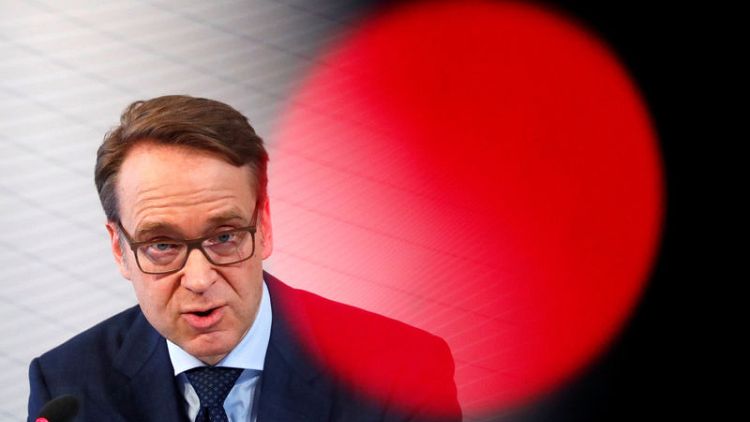By Balazs Koranyi and Frank Siebelt
FRANKFURT (Reuters) - Bundesbank President Jens Weidmann expressed scepticism on Friday about a proposal to grant banks some relief from negative central bank rates, arguing that cost could outweigh the benefits.
The gain from such a scheme would be limited while the cost associated with even more protracted policy normalisation could be greater, Weidmann, a potential candidate to succeed ECB chief Mario Draghi later this year, told a Bundesbank event in Frankfurt.
The European Central Bank is studying whether to grant relief to banks from some of the charges on its minus 0.4 percent deposit rate, worried by weak bank profitability could impair the transmission of its policy.
"The potential relief by tiered interest rates, as they are being discussed at the moment, would be noticeable, but ultimately limited," Weidmann said.
"And the relief will likely be lower than additional cost arising from shifting normalisation expectations resulting from this discussion," he added.
A tiered deposit rate could return on the magnitude of 5 billion euros to banks, analysts say. But given its complexity, such a scheme is unlikely to be in place for just a short period, implying negative rates for an even longer period.
Such a prospect would flatten the yield curve even more and compress bank margins, suggesting even weaker earnings.
Weidmann also noted that restoring adequate profitability was ultimately the sector's responsibility, a comment that echoes fellow Governing Council members who argue that the ECB's responsibility is to ensure price stability not bank profits.
The ECB is expected to discuss tiering in June but sources close to the discussion said that there is little appetite among policymakers for such a scheme.
With regard to Germany's ailing economy, Weidmann said that the growth dip seems to be longer than earlier thought and the government's projection for growth of just 0.5 percent was plausible.
He added that first quarter figures were likely solid but mostly due to one-offs related to mild weather and there was no overall improvement in the economy outside the construction sector.
Still, a recovery is likely later this year, he argued, maintaining the Bundesbank's long-standing line that the slump is not the start of a recession but merely a temporary dip to be followed by renewed growth.
(Reporting by Balazs Koranyi; Editing by Mark Heinrich and Raissa Kasolowsky)



